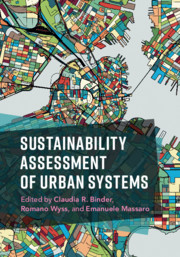Book contents
- Sustainability Assessment of Urban Systems
- Sustainability Assessment of Urban Systems
- Copyright page
- Contents
- Preface
- Acknowledgments
- Contributors
- General Introduction
- Part I Theoretical Background
- Part II Integrative Approaches for Sustainability Assessment
- Part III Perspectives on Urban Sustainability
- 10 Conceptualizing Urban Systems for Sustainability Assessment: Four Powerful Metaphors
- 11 Sustainability Issues in Urban Systems from a Metabolic Perspective
- 12 Urban-Industrial Supply Systems
- 13 Indicators for Assessing the Sustainability of Cities
- 14 Ontology-Based Integration of Urban Sustainability Indicators
- Part IV Focal Points of Urban Sustainability
- Index
- References
14 - Ontology-Based Integration of Urban Sustainability Indicators
from Part III - Perspectives on Urban Sustainability
Published online by Cambridge University Press: 27 March 2020
- Sustainability Assessment of Urban Systems
- Sustainability Assessment of Urban Systems
- Copyright page
- Contents
- Preface
- Acknowledgments
- Contributors
- General Introduction
- Part I Theoretical Background
- Part II Integrative Approaches for Sustainability Assessment
- Part III Perspectives on Urban Sustainability
- 10 Conceptualizing Urban Systems for Sustainability Assessment: Four Powerful Metaphors
- 11 Sustainability Issues in Urban Systems from a Metabolic Perspective
- 12 Urban-Industrial Supply Systems
- 13 Indicators for Assessing the Sustainability of Cities
- 14 Ontology-Based Integration of Urban Sustainability Indicators
- Part IV Focal Points of Urban Sustainability
- Index
- References
Summary
A wealth of indicators and indicator sets, structured in the form of standards (e.g., ISO, OECD, SDG Index, etc.), have been developed and proposed over the past decades to define and measure urban sustainability. Unfortunately, literature studies confirm that there is a lack of knowledge systematisation for such indicator sets in the sustainability assessment domain. In this chapter, we present and describe a formal representation of knowledge about sustainability indicators and their interrelationships, through the development of a domain ontology. To increase the potential for its adaptability and reuse, as well as to facilitate its continuous redevelopment, we make the developed ontology available online, through a dedicated web portal.
- Type
- Chapter
- Information
- Sustainability Assessment of Urban Systems , pp. 332 - 350Publisher: Cambridge University PressPrint publication year: 2020

